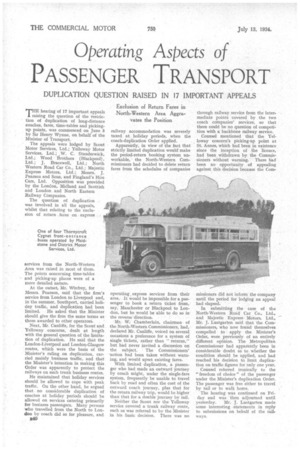Operating Aspects of
Page 54

If you've noticed an error in this article please click here to report it so we can fix it.
PASSENGER TRANSPORT
DUPLICATION QUESTION RAISED IN 17 IMPORTANT APPEALS
Exclusion of Return Fares in North-Western Area Aggravates the Position
raising the question of the restrichearing of 17 important appeals lion of duplication of long-distance coaches, fares, time-tables and pickingup points, was commenced on June 5 by Sir Henry Wynne, on behalf of the Minister of Transport.
The appeals were lodged by Scout Motor Services, Ltd.; Yenoway Motor Services, Ltd.; W. C. Standerwick, Ltd.; Wood Brothers (Blackpool) , Ltd.; J. Bracewell, Ltd.; North Western Road Car Co., Ltd.; Majestic Express Motors, Ltd.; Messrs. J. Pearson and Sons, and Fingland's Hire Cars, Ltd. Opposition was provided by the London, Midland and Scottish and London and North Eastern Railway Companies.
The question of duplication was involved in all the appeals, whilst that relating to the exclusion of return fares on express
services from the North-Western Area was raised in most of them. The points concerning time-tables and picking-up places were of a more detailed nature.
At the outset, Mr. Winfrey, for Messrs. Pearson, said that the firm's service from London to Liverpool and, in the summer, Southport, carried holiday traffic, and duplication had been limited. He asked that the Minister should give the firm the same terms as those awarded to other operators. '
Next, Mr: Cunliffe, for the Scout and Yelloway concerns, dealt at length with the general question of the limitation of duplication. He said that the London-Liverpool and London-Glasgow routes, which were the basis of the Minister's ruling on duplication, carried mainly business traffic, and that the Minister's intention in making this Order was apparently to protect the railways on such trunk business routes.
He maintained that holiday services should be allowed to cope with peak traffic. On the other hand, he argued that no considerable duplication of coaches at holiday periods should be allowed on services catering primarily for business passengers. Many persons who travelled from the North to London by coach did so for pleasure, and railway accommodation was severely taxed at holiday periods, when the coach-duplication Order applied.
Apparently, in view of the fact that strictly limited duplication would make the period-return booking system unworkable, the North-Western Commissioners had decided to delete return fares from the schedules of companies operating . express services from their area. It would be impossible for a passenger to book a return ticket from, say, Manchester or Blackpool to London, but he would be able to do so in the reverse direction.
Mr. W. Chamberlain, chairman of the North-Western Commissioners, had, declared Mr. Cunliffe, voiced on several occasions a preference for a system of single tickets, rather than " returns," but had never invited a discussion on the subject. The Commissioners' --action had been taken without warning, and would upset existing fares.
With limited duplication, a passenger who had made an outward journey by coach might, under the single-fare system, frequently be unable to travel back by road and often the cost of the outward coach journey, plus that for the return railway trip, would be higher than that for a double journey by rail.
Neither the Scout nor the Yelloway service covered a trunk railway route, such as was referred to by the Minister in his basic decision. There was no through railway service from the intermediate points covered by the two coach companies' services, so that there could be no question of competition with a backbone railway service.
Counsel mentioned that the Yel .
loway concern's picking-up point at St. Armes, which had been in existence since the inception of the licence, had been withdrawn by the Commissioners without warning. There had been no opportunity of appealing against this decision because the Corn missioncrs did not inform the company until the period for lodging an appeal had elapsed.
In submitting the case of the North-Western Road Car Co., Ltd., and Majestic Express Motors, Ltd., Mr. J. Lustgarten said that the Commissioners, who now found themselves compelled to apply the Minister's Order, were previously of an entirely different opinion. The Metropolitan Commissioner had apparently been in considerable doubt as to whether the condition should be applied, and had reached his decision to limit duplication on traffic figures for only one year.
Counsel referred ironically to the "freedom of choice" of the passenger under the Minister's duplication Order. The passenger was free either to travel by rail or to walk home. The hearing was continued on Friday and was then adjourned until yesterday. Mr. J. Lustgarten made some interesting statements in reply to submissions on behalf of the railways.




























































































